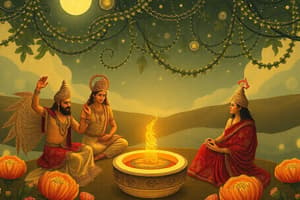Podcast
Questions and Answers
What is the reason for Arjuna's depression according to the conversation?
What is the reason for Arjuna's depression according to the conversation?
- Arjuna has lost his will to fight against his teachers. (correct)
- Arjuna is saddened by the thought of fighting in a war.
- Arjuna is unhappy with his current living situation.
- Arjuna is concerned about his place in the afterlife.
What does Krishna criticize Arjuna for?
What does Krishna criticize Arjuna for?
- His impulsive decision-making
- His impotence in the face of a great challenge (correct)
- His lack of compassion for his enemies
- His hesitation in battle
What is Arjuna's concern about the outcome of the battle?
What is Arjuna's concern about the outcome of the battle?
- That he might not win against his enemies
- That he will lose his reputation as a warrior
- That he will not be able to protect his people
- That he will be guilty of killing his teachers (correct)
What does Arjuna see as an alternative to fighting?
What does Arjuna see as an alternative to fighting?
What does Arjuna ask Krishna to do?
What does Arjuna ask Krishna to do?
According to Kṛṣṇa, what do wise people not lament for?
According to Kṛṣṇa, what do wise people not lament for?
What is the nature of the self, according to Kṛṣṇa?
What is the nature of the self, according to Kṛṣṇa?
Why should Arjuna not be disturbed by happiness and distress?
Why should Arjuna not be disturbed by happiness and distress?
What is the consequence of being disturbed by happiness and distress?
What is the consequence of being disturbed by happiness and distress?
What is the relationship between the material body and the soul?
What is the relationship between the material body and the soul?
Flashcards
Arjuna's Depression Cause
Arjuna's Depression Cause
Arjuna lost motivation to fight against his teachers.
Krishna's Criticism
Krishna's Criticism
Krishna criticized Arjuna's weakness in facing the challenge.
Arjuna's Battle Concern
Arjuna's Battle Concern
Arjuna feared harming his teachers in battle.
Arjuna's Alternative
Arjuna's Alternative
Signup and view all the flashcards
Arjuna's Request
Arjuna's Request
Signup and view all the flashcards
Wise People's Lamentation
Wise People's Lamentation
Signup and view all the flashcards
The Self's Nature
The Self's Nature
Signup and view all the flashcards
Distress/Happiness Impact
Distress/Happiness Impact
Signup and view all the flashcards
Distress/Happiness Consequence
Distress/Happiness Consequence
Signup and view all the flashcards
Body and Soul
Body and Soul
Signup and view all the flashcards
Study Notes
The Conversation Between Arjuna and Kṛṣṇa
- Kṛṣṇa speaks to Arjuna, who is filled with compassion and depression, and asks him why he has become impure.
- Arjuna is conflicted about fighting his respected teachers and family members, such as Bhīṣma and Droṇa, in the battle.
Arjuna's Dilemma
- Arjuna feels that it would be better to live by begging than to kill his teachers and enjoy the fruits of their deaths.
- He is unsure of what is better, conquering or being conquered by them, and is consumed by grief and weakness.
Kṛṣṇa's Counsel
- Kṛṣṇa advises Arjuna that wise men do not lament for the living or the dead, as the soul is eternal and indestructible.
- He explains that the changes in the body, such as from boyhood to old age, are similar to the changes in seasons, and should not be a cause for distress.
- A person who is steady in the face of happiness and distress is eligible for liberation.
The Nature of the Soul
- The soul is eternal, unborn, and ever-existing, and does not come into being or cease to be.
- The material body is indestructible and will come to an end, but the soul is not slain when the body is slain.
- Neither the one who thinks the soul is the slayer nor the one who thinks it is slain is in knowledge, as the soul does not slay or get slain.
The Call to Action
- Kṛṣṇa encourages Arjuna to fight, as the soul is indestructible and the material body will come to an end anyway.
Studying That Suits You
Use AI to generate personalized quizzes and flashcards to suit your learning preferences.




